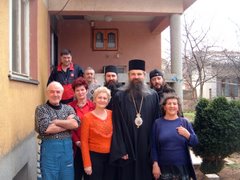Latest Round of Talks End In Stalemate
Kosovo talks near dead
September 15, 2006 1:37 PM
VIENNA, Austria-U.N.-brokered talks on the future status of Kosovo are in jeopardy, the deputy United Nations envoy warned Friday at negotiations clouded by a car bombing that targeted the interior minister of the ethnically divided province.
"We're approaching a moment where by talking alone we won't accomplish the goal," said Albert Rohan, the U.N. official overseeing Friday's latest round of talks in Vienna. "We could talk for another 10 years and not change anything."
Serbian and ethnic Albanian negotiators discussed how to decentralize power in Kosovo to give its minority Serbs more of a voice. But the session, like the eight others that have preceded it, ended in a stalemate, increasing the likelihood that an impatient U.N. Security Council will impose a solution by declaring Kosovo independent.
That could trigger a showdown with Serbia, which considers the province the heart of its ancient homeland and insists it should remain within Serbian territory.
Martti Ahtisaari, the chief U.N. envoy for Kosovo, heads to New York this weekend to brief key members of the Security Council on the progress, or lack of it, in talks that began in February to reach a negotiated settlement.
"The prospect of progress in these talks is increasingly slim," Rohan told reporters.
Asked when he would be prepared to call it quits, Rohan was evasive, but he conceded it was increasingly unlikely that a solution would be reached by the end of the year, the target when the negotiations began.
"We cannot extend this infinito," he said.
Underscoring the tensions and lawlessness that still plague Kosovo, a bomb exploded beneath the Kosovo interior minister's car in the province early Friday, but did not injure him. It was not clear whether the attack was meant to kill the recently appointed minister, Fatmir Rexhepi, or whether it was carried out by Serbs or by Rexhepi's ethnic Albanian political opponents.
Kosovo's parliament speaker, Kole Berisha, said he considered the explosion directed against the talks to undermine stability at a decisive moment.
Deputy Prime Minister Lufti Haziri, who led the ethnic Albanian delegation in Friday's round of negotiations, condemned the bombing but played down its impact on the talks.
The United Nations has administered Kosovo since 1999, when NATO air strikes drove out Serb troops who had carried out a bloody crackdown on its independence-seeking Albanian population, which accounts for 90 percent of Kosovo's 2 million population.
About 16,000 NATO-led peacekeepers still patrol the province.
U.S. and EU envoys who visited Kosovo this week pressed ethnic Albanian leaders to provide more guarantees that the Serb minority would be protected from violence and discrimination.
Lawmakers in Belgrade this week decreed that Serbia's new constitution will refer to Kosovo as a "historic and integral part of Serbia", even if the U.N. talks result in Kosovo's independence.
Rohan said the two sides deadlocked over how many new municipalities should be set up to give Serbs more influence in day-to-day affairs in areas where they form a local majority.
An estimated 200,000 Serbs fled Kosovo after the 1988-99 conflict, fearing revenge attacks. Today, only about 100,000 remain, most living in small, isolated enclaves scattered around the province.
Friday's talks bogged down over Kosovska Mitrovica, a divided city that was a flashpoint during the war and continues to breed interethnic strife. The Albanians said they resisted Serb efforts to incorporate the mostly Serb north of the town into a new district and to create nearly a dozen new municipalities that Haziri insisted would not be financially sustainable.
"We have reached our limits," Haziri said.
Slobodan Samardzic, leading the Serb delegation, said Kosovo's Serbs were intent on gaining more freedom of movement and guarantees that they would not be persecuted.
"We are faced with daily infringements of human rights," he said.

















